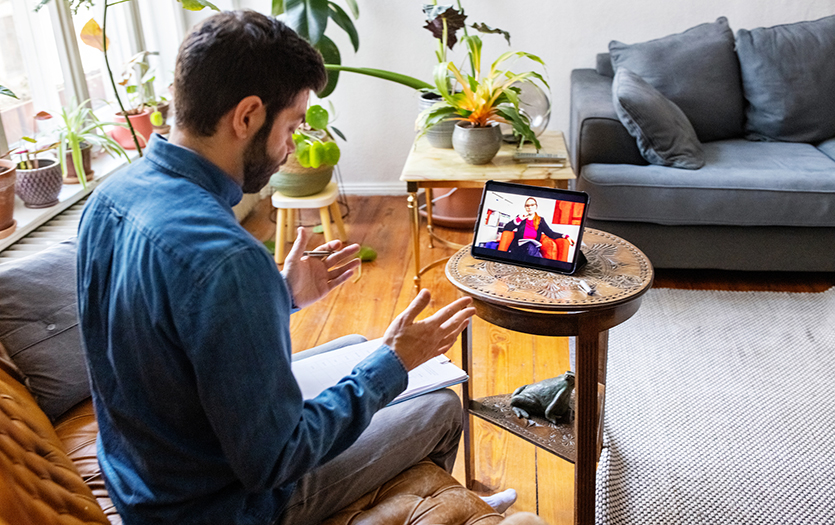
This post was written by Courtney L. Washington, PsyD, CSAYC, HSPP, Parkview Behavioral Health Institute.
One positive impact that has come out of the global pandemic of COVID-19 was the expansion of telehealth services. This has allowed more people to have access to desperately needed healthcare including mental health services. For many, the idea of going to therapy is intimidating. For some being able to join therapy from the comfort of their home or office decreases some of this discomfort. So, what can be expected from telehealth?
What is teletherapy?
Teletherapy is the administration of individual, family and group therapy through the use of technology. This can be done via video using a variety of platforms or via audio through the telephone. Each medium offers benefits and downfalls that are important to consider.
Some of the important positives of both mediums include convenience, relative ease with accessing care, and the ability to connect despite barriers. However, on the phone, we lose all non-verbal information provided through interactions. At times this can make the interaction seem more disconnected. Due to this I often find myself checking in verbally with clients more frequently.
Many people prefer using the phone as it is familiar and most people are comfortable with conversing over the phone. As for video sessions, this is the closest we get to sitting in the same room with a person. And as such, we receive more non-verbal feedback and there is the possibility of greater connection; the brain registers the face cues, body movements, and silences in a very similar manner. Despite this, communication gaps may be present and the transmission of palpable feelings from one person to another can be less impactful.
One of the more challenging aspects of video sessions is the delay that often occurs. While this can be difficult and may feel like the client and therapist are disjointed, it is possible to find a productive flow and rhythm in each session. For this reason, rapport with the therapist is imperative, as this relationship helps in establishing the rhythm that works for you.
Other aspects to consider when selecting a telehealth medium include the physical space you have, concerns with access to reliable internet and comfortability showing spacing over the web. For the therapist, this window into a client’s world can offer helpful information and may deepen clinical understanding. Being in the home may also be productive in executing interventions and being able to apply the discussion in the “here and now.”
Video sessions can be particularly challenging for those with struggles related to body image or sense of self, as seeing their reflection may be distracting. Lastly, and maybe most important is the ability to have a safe and private space to conduct your session. Therapy is challenging and vulnerable. It is important to ensure you are having sessions in a manner that allows for safety and privacy.
How to decide which forum is right for me?
Ideally, this discussion will occur with you with your therapist. It is important to openly explore the positives and downfalls each medium provides. It could be helpful to try each out and see which feels most comfortable and is the most conducive to your work. At the end of the day, you know yourself best.
Don’t hesitate to speak openly about this information. In addition to the considerations mentioned above, ask yourself:
- Do I have reliable internet?
- Do I have the necessary technological devices (phone, tablet, or computer) to run the video app?
Finding the right provider
While the medium may be different, patient privacy and confidentiality are still of the utmost importance. The therapist should and will continue to work diligently to follow HIPPA guidelines. They will be sure to be in a private space free of distractions or others as a means to protect your privacy. Ideally, they will be transparent in confirming this with you at the onset of each session.
While the experience of teletherapy is different, the relationship remains the most important factor in producing therapeutic change. When considering this, keep in mind that this connection may be more challenging via telehealth. At the end of the day, your therapist is a human and they too are doing their best. Despite their best effort, they may appear or feel less attuned and accurate in their perceptions, due to the loss of non-verbal communication mentioned above. Remember despite all of this, if it isn’t a good fit, that is okay. Try someone new. Don’t give up. Finding someone who works well with you is the key to a successful and productive therapeutic relationship regardless of the medium.
Tips and tricks
To get the most out of your teletherapy visit:
- Have the appointment on your scheduled.
- Have the link or number ready.
- Plan to arrive early, just in case you need to download software etc.
- The therapist will likely call you, but good to have numbers and links just in case. Discuss this plan beforehand.
- Have some patience and give each other grace. Sometimes technology does not cooperate despite best efforts.
- Bring a notebook, something to fidget with and a drink.
- Find a safe and comfortable space.
- Don’t be afraid to hold this space for yourself. Plan to take a few minutes before and after the session to get into the right “headspace” or recover from an emotional session.
- Remember, if you connect through body language and eye contact, this may not feel the same or as gratifying through telehealth.
- Consider- Can others hear you? Are you okay with this? Are you going to be comfortable processing challenging topics? Are you in a safe space to discuss difficult topics?
- Be sure to check in with yourself after a session. It may be helpful to engage in self-care like taking some quiet time, going for a walk or connecting with a friend for support.
Therapy is important and challenging work that all people can benefit from. It is okay, to not be okay or to be struggling with whatever is challenging you. You do not have to struggle alone. Please reach out for help or connection.
Call the PBHI HelpLine at 260-471-9440 or toll-free at 800-284-8439, anytime 24 hours a day. Our experienced specialists can answer your questions, provide recommendations and help arrange care.



